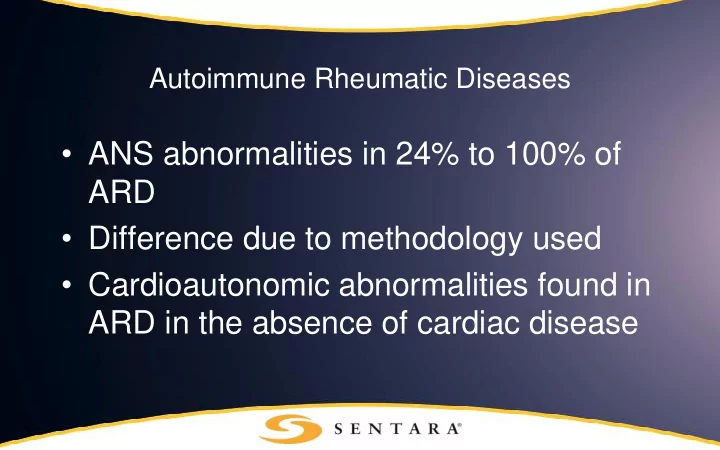

Autoimmune Rheumatic Diseases • ANS abnormalities in 24% to 100% of ARD • Difference due to methodology used • Cardioautonomic abnormalities found in ARD in the absence of cardiac disease
Systemic Lupus Erythematosus • Affects multiple organs • Neuropsych manifestations • CNS mostly affected (up to 60%) • ANS frequently involved (up to 93%) but under-recognized • Most often asymptomatic • No correlation with disease activity, presence or absence of PN, presence or absence of neuropsych manifestations • Questions: does a subclinical dysautonomia in SLE affect quality of life? Do patient develop clinical symptoms down the road?
Rheumatoid Arthritis • 30% develop a small fiber neuropathy • Cold feet, purple extremities, Raynaud’s, orthostatic tachycardia, rarely OH • Advanced RA: parasympathetic CV dysfunction (60% in one study), abnormal distal sweat output (> 50%) • No correlation with duration of disease, RF titer, articular destruction • Another study: no CV ANS abnormality in 43 patients with RA!
Sjögren’s Syndrome • About 60% develop a small fiber neuropathy • Definite involvement of the ANS • In one study: 50% of SS develop symptoms of ANS dysfunction and 66% had abnormal autonomic testing • No correlation between ANS and decreased salivation or tearing • Anti-muscarinic (M3) receptor Ab, cytokines inflammation of autonomic ganglia
Ankylosing Spondylitis • Inflammatory disease of spine and SI joints • Orthostatic tachycardia ? • Fluctuating BP? • Mechanisms unknown
Fibromyalgia • Part of spectrum of primary disorders of the ANS • Loss of circadian rhythm, increased sympathetic sensitivity, decreased sympathetic response to stressors (can explain increased fatigue, low BP). Urinary symptoms, IBS, etc
Scleroderma (Systemic Sclerosis) • Autonomic neuropathy in CREST (parasympathetic and sympathetic) • Could explain sleep disturbances and fatigue, GI disturbances, tachycardia • ANS dysfunction early in scleroderma?
Summary • CV Autonomic dysfunction common in ARD • ANS dysfunction in SLE, SS, Scleroderma, FM, RA • Disease duration, severity, damage not relevant • Autoantibodies against ANS could be responsible • Testing of ANS in ARD warranted to detect early CAN • Significance of abnormalities found in the autonomic lab? In absence of symptoms?
Recommend
More recommend